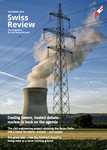Hard bargaining in parliament
The initiative has alarmed businesses that see it as a threat to their global operations and commercial freedom. Yet polls show that the idea has significant public support. Parliament’s search for a compromise proposal involved a considerable degree of horse-trading. The National Council wanted to meet the authors of the initiative halfway – satisfying their core demands by proposing new corporate liability requirements in company law.
But the Council of States blocked this, a majority of its members viewing the regulation as unnecessary and damaging for Swiss business. Ultimately, both parliamentary chambers agreed on a watered-down indirect counterproposal to impose reporting obligations, whereby companies would merely have to include details in their annual reports of how they carry out their duty of care. This arrangement is equivalent to the EU’s accountability principle (see box). It would automatically come into effect if the initiative was rejected.
“Token counterproposal”
Dick Marty, co-chair of the Responsible Business Initiative, has called it a “toothless token counterproposal”. “As we all know, the worst culprits tend to be the ones with glossy company brochures,” says the former state prosecutor of the canton of Ticino and former FDP member of the Council of States. Marty, who made a name for himself outside Switzerland as the Council of Europe’s special rapporteur on human rights, believes that companies will only conform when human rights violations have consequences.
Opponents from the business community and the centre-right parties say that the initiative clearly overshoots the mark. Andrea Gmür, CVP member of the Council of States for the canton of Lucerne, is particularly concerned that the proposed changes would “reverse the burden of proof”. Obliging companies to prove their innocence “contradicts the principles of the rule of law” and will lead to “extortionate international lawsuits”. Tarring all companies with the same brush is unacceptable, says Gmür, who sits on the board of the Central Switzerland Chamber of Commerce and Industry.














Comments
Comments :
"Die Freiheit des Einzelnen endet dort, wo die Freiheit des Anderen beginnt." (Immanuel Kant)
Schiesst die Initiative weit über das Ziel hinaus?
Was ist das Ziel, die kontinuierliche Ausbeutung von Mensch und Umwelt?